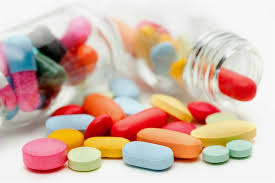
Pharmacists disturbed as insecurity chokes drug distribution amid price hike
Pharmacists have voiced concern over how Nigeria's growing insecurity is affecting drug distribution around the nation, as sick Nigerians deal with ongoing price increases for necessary medications.
They clarified that in addition to upsetting the drug distribution chain, the nation's security issues have caused a rapid rise in medical prices, making many ill Nigerians unable to pay life-saving treatments.
Senior medical professionals also mentioned how the interruption had made the health sector's predicament worse.
The chemists who made this information exclusively known claimed that many patients had restricted access to medications as a result of the insecurity, thus taxing the healthcare system.
The specialists voiced concern about the ongoing increase in the price of medications had worsened lately with fear of no end in sight among Nigerians.
They maintained that addressing the rising insecurity was crucial for stabilising drug prices and ensuring consistent access to medications in the country.
Vice-President of the Diabetes Association in Nigeria, Mr. Bernard Enyia recently lamented that in 2023, he managed his condition with a monthly budget of N70,000 for insulin and other medical expenses, but now spends over ₦180,000 monthly on the same medication.
“A year ago, I managed my diabetes with a monthly budget of N70,000 for insulin and other medical expenses.
“Today, I spend over ₦180,000 monthly, a figure that more than doubled.
Recall that scarcity of forex, high cost of production, cost of raw materials, subsidy removal, and high interest rate are still factors driving drug prices beyond 300 percent.
The spike in prices was further caused by the depreciation of the naira and the exit of foreign pharmaceutical companies in the country.
The experts also said since the British multinational drug maker and biotechnology company, GlaxoSmithKline, announced its exit from Nigeria in August last, the prices of the drug produced by the company have reportedly skyrocketed and become scarce.
Also, the naira maintained a downward trend since the Central Bank of Nigeria, in June last year, allowed a free float of the national currency against the dollar and other global currencies.
The declining naira value, they said, had led to manufacturers struggling to get raw materials, cutting production costs and jobs.
Speaking with our correspondent, a former Chairman of the Association of Industrial Pharmacists of Nigeria, Dr. Lolu Ojo, highlighted how insecurity in Nigeria significantly impacts the cost and distribution of drugs.
Ojo, who is also a member of the Manufacturers Association of Nigeria's Pharmaceutical Manufacturers Group, noted that disruptions on a number of routes, particularly in the North, East, and Middle Belt regions, are impeding the flow of medications.
The chemist pointed out that worries about attacks by Fulani herders have made even previously safe routes in the Western area dangerous.
Ojo, who also serves as the managing director of Merit Pharmaceutical Company, claimed that he is compelled to use air transport for his shipments in order to reduce these dangers, even if it is more expensive.
Ojo underlined that pharmaceutical firms faced higher operational costs, lower profit margins, and even danger to their survival as a result of the growing insecurity throughout Nigeria.
He asked the government at all levels to deal with the security concerns to prevent further increases in drug prices and disruptions in pharmaceutical distribution.
Ojo highlighted that even the more economical road transport routes are now significantly compromised by security threats.
“These additional costs inevitably translate into higher prices for drugs and other products, particularly affecting the movement of goods between regions like the North and South East where insecurity is most severe,” he added.
Corroborating his statement, the Chairman of the Pharmaceutical Wholesalers and Distributors Association of Nigeria, Ogheneochuko Omaruaye, affirmed that the rising insecurity in the country had significantly impacted drug distribution.
He explained that this disruption not only increases the cost of drugs but also affects their availability.
Omaruaye, also the Managing Director of New Height Pharmaceuticals in Lagos, stated, “In Nigeria, the cost of distributing medicines to the northern regions is higher compared to other areas.
“This is due to the combination of insecurity and poor infrastructure, which makes transportation more costly and challenging.
Because there are certain places we currently avoid owing to security concerns, security is important when it comes to drug distribution.
For example, delivery times that used to be 48 to 72 hours now take one to two weeks, particularly when delivering drugs to regions in the core North, such as Borno State.
"This is because they'll inform you that at specific hours of the day, you're not allowed to move. For example, if you are shipping prescription drugs to the South East, make sure you don't send them on a Monday.
He pointed out that because of the difficulties they have with drug distribution logistics, this is a significant problem that requires immediate attention because it affects their operations by raising costs and restricting access to certain parts of the country.
He continued: “We also struggle to send our staff to work in these areas because of security challenges. Consequently, when drugs are sent from Lagos and take one to two weeks to reach their destination, each additional day has cost implications.
“So those are these issues. We need to address the issue of insecurity headlong and the government should also subsidise the logistics for medicines to reduce costs.
“However, a major significant increase is forex because everything that has to do with drugs here is imported and even the local manufacturers are imported and had to source for forex.
"We still import raw materials; we don't create them locally. The medications will be high as long as the materials are high. The worst affected are the local manufacturers that still have to pay high electrical costs due to sourcing for currencies. Each of these has an impact on the national medicine price.





